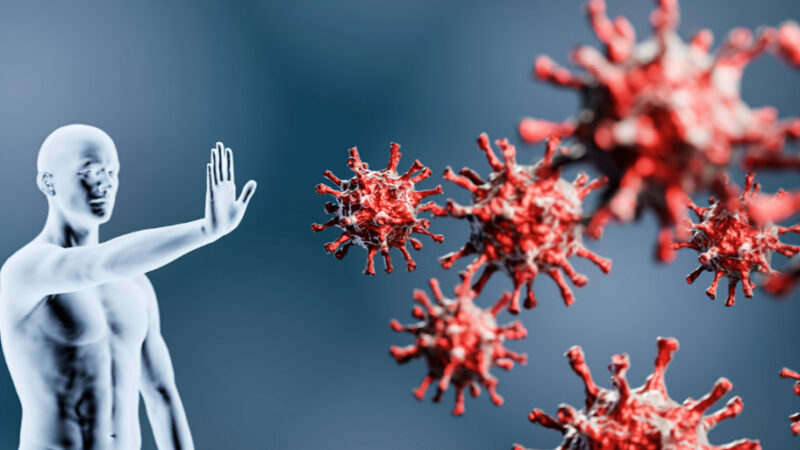
Your Immune System is Your Daily Defense Against Invaders
At its peak, your immune system defense works like a master orchestra performing in harmony. Upon detecting potential threats — including bacteria, parasites, and viruses — your immune system unleashes a powerful army to destroy these foreign invaders.
Usually, this defense works well, protecting you against illness. But sometimes stress and other factors cause the immune system to work too hard. An overactivated immune system can create problems like allergies, asthma, or eczema.
An overactive immune system might begin to also begin attacking your healthy tissues and organs, like your joints and pancreas. This may result in autoimmune disorders — there are over 80 known ones — including rheumatoid arthritis and type 1 diabetes.
What Damages Your Immune System?

An unhealthy diet, not exercising enough, and getting insufficient sleep can make a healthy immune system go bad.
A weak immune system can’t fight the bacteria, viruses, and toxins that overwhelm your body. As a result, you become increasingly susceptible to infections.
These three conditions underlie these immune problems:
– Oxidative stress
– Chronic inflammation
– Psychological stress
Your body generates a certain amount of free radicals. Free radicals are the “foreign invaders” that create problems in your body and activate your immune system. Breathing, exercise, eating, drinking water, and using medications generate them. Some free radicals are even essential to life. Even your immune system benefits from some free radicals to fight foreign invaders that can make you sick.
Normally, your body can balance those free radicals with antioxidants.
But when too many disturb your body’s antioxidant defense system, a condition called oxidative stress results. Over time, those free radicals can damage tissue and contribute to diseases including diabetes.
Diet and lifestyle choices contribute to oxidative stress. Not getting enough sleep can increase that free radical load. So can a diet low in plant foods, which contain antioxidants. When you lower the number of free radicals in your body, you also improve your immune system and overall health.
Chronic inflammation and immunity also go together. Your immune system responds to injuries, like cuts, bruises, and pulled muscles, with inflammation. Immune cells quickly react to the damaged area to fix that problem. Think of the callus or scar tissue that builds up over a wound. This is your immune system sending cells to repair the tissue and heal it. But once the healing process is over, the inflammation should go away. When your immune system stays activated all the time, a condition called chronic inflammation occurs.
Chronic inflammation damages healthy cells and contributes to a wide range of conditions, from cancer to asthma.
Inflammation can impact your immune system in ways you might not suspect. Inflamed blood vessels, for instance, make it difficult to keep your fingers, toes, ears, and nose warm.
Like free radicals and inflammation, a little bit of stress can be good for your immune system. But maintaining the right balance is key. Constant stress on your body, whether it is exercising too much or mental stress, can weaken your immune system and create inflammation.
It’s no coincidence if you get sick after you’ve had a rough week at the office or juggled additional responsibilities. Over 300 human studies over three decades show this type of stress can negatively impact your immune system.
Among its damage, stress can decrease the white blood cells that help fight off infection. It can keep levels of cortisol raised when this stress hormone should taper down, increasing inflammation. Anxiety, depression, and burnout can further create stress that raises inflammation.
Altogether, these three processes — oxidative stress, chronic inflammation, and physical and psychological stress — take their toll on your immune system, weakening its ability to fight infections.
Ways to Boost Your Immune System Defence

Boosting Immune System Defense
Of course, you already know what you can do to enhance your immunity:
Here are some strategies to support your immune system and fight off pathogens:
– Eat a colorful array of fruits and vegetables with antioxidants
– Exercise regularly, but not too much
– Maintain a healthy weight
– Don’t smoke- or quit, if you do
– Get quality sleep
– Wash your hands regularly
– Reduce stress levels
Daily Defense Nutrients
There are other nutrients that can act as your daily defense against free radicals and infection, and help you manage your stress levels. These are the top four most-researched nutrients for your immune health.
Curcumin
Curcumin, the orange-yellow component of the spice turmeric, provides anti-inflammatory benefits to support your immune system.
This powerful antioxidant can activate a wide range of immune cells that lower pro-inflammatory proteins. In fact, most research on curcumin focuses on its anti-inflammatory and antioxidant benefits.
Those benefits allow curcumin to support a wide variety of conditions, including diabetes, anxiety, exercise-induced inflammation, and arthritis.
Even if you don’t have these and other conditions, a relatively low dose of curcumin can provide health benefits. After all, oxidative stress and inflammation impact almost everyone.
To get these benefits, sprinkle organic turmeric on your food. But to get the most benefit, you’ll want to take a curcumin supplement. Curcumin is the active ingredient in turmeric and the most studied for its benefits.
Most curcumin supplements absorb poorly. One solution is to attach a “carrier” so you get more of that nutrient.
One specific brand of curcumin — Curcumin C3® Complex — combines curcumin with piperine, the major active component of black pepper. This can increase curcumin’s availability by an impressive 2,000 percent. MaxLiving has a powerful curcumin supplement, Curcumin C3® with BioPerine®; it has this type of curcumin.
You might want to combine this with some other ingredients, too, that support a strong immune system.
Indian Gooseberry Extract
Indian gooseberry grows in India, the Middle East, and some southeast Asian countries. The fruit of this tree has a long history in Ayurveda medicine, primarily because of its ability to scavenge free radicals. Processing the fruit increases the benefits of vitamin C and other antioxidants.
Animal studies also show Indian gooseberry can fight inflammation and help manage many acute and chronic inflammatory conditions. One rodent study gave rats Indian gooseberry after surgery. After 15 days, the rats had lower inflammation levels and reduced pain levels.
This extract also has lower microbes, like bacteria and mold, that can make you sick. Indian gooseberry’s antioxidant and antimicrobial benefits make it ideal for people with stomachache, pain, swelling, and more.
Extramel® M Melon Extract
Researchers estimate about 30 percent of us will experience fatigue, stress, and anxiety at some point in our lives. You probably already have. Fatigue, stress, and anxiety all create inflammation and weaken your immune system.
Extramel® M — a clinically studied freeze-dried melon juice concentrate from a specific, non-genetically modified (non-GMO) variety of melon — provides high levels of the specific antioxidants your body needs to support those and other conditions.
In one study, this extract significantly improved stress and fatigue linked to performance, pain, sleep problems, trouble concentrating, irritability, and more compared with the placebo.
Extramel® M can dramatically boost superoxide dismutase (SOD). This enzyme acts as a “super” antioxidant defense to protect against oxidative stress and inflammation.
The SOD and other antioxidants Extramel® M provides fight oxidative stress, help improve stress and fatigue, support brain function, and boost the overall quality of life.
The correct amounts of SOD can protect against many conditions including:
– Cancer
– Inflammatory diseases
– Cystic fibrosis
– Ischemia
– Aging
– Rheumatoid arthritis
– Brain disorders
– Diabetes
N-Acetyl-L-Cysteine
N-Acetyl-L-Cysteine is your master antioxidant; it is called glutathione, and directly scavenges a diverse range of free radicals, which helps to reduce oxidative stress.
Glutathione is the most abundant antioxidant in your body, and for good reason. It protects your cells against damage, supports your immune system, and can even help you live longer.
Your body can make glutathione. But oxidative stress, inflammation, and environmental toxins can all lower glutathione levels. Having high blood sugar, psychological stress, taking certain medications, and a poor diet also lower glutathione levels in your body. Researchers link low levels of glutathione with aging and numerous diseases.
Fortunately, you can give your body the materials to build ideal amounts of glutathione.
One of them is N-acetyl-L-cysteine (NAC), a unique form of the amino acid cysteine and a building block for glutathione. Studies show NAC can substantially increase glutathione in virtually everyone.
For some diseases like human immunodeficiency virus (HIV), the right amount of NAC can improve and even restore immune function.
Its antioxidant and anti-inflammatory benefits also make NAC ideal for other conditions including heart disease, liver and kidney damage, and high blood sugar.
These four nutrients work very well on their own to support your immune system. But they work even better together. That’s why we’ve combined them in one easy-to-take capsule: Daily Defense.
Just like the bacteria and cells in your immune system work together as a team. The four nutrients in Daily Defense work synergistically to protect your cells against free radicals, inflammation, and stress that can negatively impact your immune system.
Looking to improve your dietary habits? Consult our certified nutritionists for expert nutritional counseling. With our guidance, make informed decisions to optimize your health and well-being.

